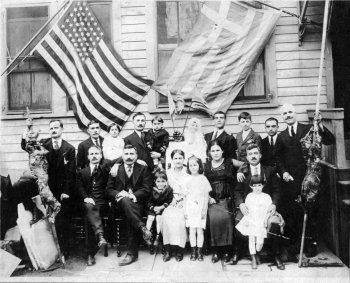|
Workshop
report
Greek identity is determined “not only by the inanimate
structures that belong to bygone times but by the living tradition" Ahrweiler-The
Making of Europe

Our project involved a comprehensive and complex discussion of the way diasporic
communities attempt to define themselves and construct identity. We have tried
to approach different definitions of Greekness that are characterized by
“hybridization” and “intercultural encounters.”
We have reached an agreement that blood, language, and culture are the elements
employed to impose the notion of Greekness on diasporic communities. In Greek
communities, identity is constructed by means of a strong connection to the
homeland, which determines the elements that define Greekness.
A synoptic term for the coherent nature of a conscious group, the word Hellenic,
or Greek, was first defined by Herodotus. Herodotus' definition, which for his
day might well be considered an accepted one, specifies homaimon, as he who is
akin or of common blood; while also sharing a common religion, a shared
character, and a common language. These for Herodotus are of equal force and the
basic traits of Greek identity.
We discussed the concept of politismiko elahisto , as described in an article by
Professor Michalis Damanakis as the “forms of Greekness found among Greeks
abroad…assimilated into their host societies and which, in extremis, entail…an
elementary, imagined, or myth-based form of Greek identity…based on a minimal
sense of culture.”
Evidence of participation in patterns of Greek life was determined not by birth
or Greek descent, but chiefly, by participation in a “Greek education” which of
itself allowed unimpeded access to works of Greek literature.
We agreed on the complexity of attempting to construct an identity based on two
contradictory categories. Identifying someone as “Greek-American” implies a
particular form of schizophrenic hybridity since, being American, means “being
non-European.” This “double consciousness” characterizes the Greek American and
Greek Australian communities, and points to the ambiguity that characterizes
them.
Some students argued for a more dynamic and fluid definition of Greekness
pointing out that in an era dominated by multiculturalism and globalization, the
“politismiko elahisto” is increasingly becoming that which defines the majority
of diasporic communities. They have described Hellenism as “an entity without a
center, a type of galaxy in which various stars shine with different intensity”.
They continued stressing that “we cannot deny the existence of a historic Greek
space — which, by the way, is more extensive than the territory under the
jurisdiction of the modern Greek state”. Variation in the forms of Greekness
allows for different ways of imagining this cultural space: as a political or
economic homeland, as an ancestral land, as a space in which language or the
classical Greek traditions or the Orthodox religion took root and flourished, or
as a source of identity adapted to a new homeland. They described their vision
of a system that accommodates various definitions of Greekness, in which even a
minimal cultural sense of Greekness is acceptable and one can, in fact, choose
whether — and how — to be Greek.
The construction of identity in diasporic communities is motivated by two major
impulses/desires. The first seeks an identity related to a homeland that will
provide the diasporic community with strong cultural, historical, and racial
roots. This form of identity requires a strong connection between center/homeland
and the periphery/diaspora. The second seeks an identity that imparts cultural
roots to the diasporic community but at the same time remains autonomous from a
homeland, and consequently from a “territorially bounded nation.” Whether
constructing an identity in relation to a homeland or in opposition to/autonomy
from one, diasporic communities remain closed communities characterized by both
exclusionary and inclusive mechanisms.
<-----
Αρχική
|